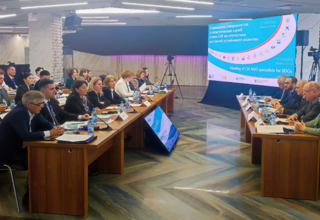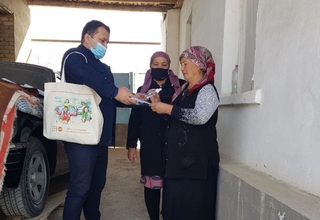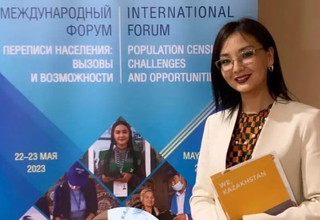An innovative new course on demography in Kyrgyzstan is aiming to equip future specialists with the skills to tackle emerging population trends and develop more effective strategies.
The university course was launched with UNFPA support and in collaboration with the Academy of Public Administration under the President of the Kyrgyz Republic (APA), experts from the Institute for Demographic Research of the Russian Academy of Sciences (IDR-RAS) and partners from Higher School of Economics University and Moscow State University. It is intended for second-year bachelor's students in the State and Municipal Management faculty of APA. It is the first course of its kind to be included in a university programme in Central Asia, with the hope of inspiring other institutions in the region to add demography to their syllabi.
To help prepare demography experts to teach university students, a comprehensive training programme was conducted for 31 academic staff from APA, the International University of Kyrgyzstan, Kyrgyz National University and Bishkek State University as part of the CISPop project in 2023. Members of the National Statistics Committee and the Military Institute also participated. This initiative significantly enhanced their capacity to deliver the newly launched demographic course at APA and provided a foundation for teaching other demography courses in the future.
The course "Demography" covers crucial topics such as population-related Sustainable Development Goals, targets and indicators, and the roles of youth, gender and the economy.
An initial cohort of 43 students embarked on this educational journey in the Spring semester. They engaged in independent small-scale studies on pressing demographic issues such as: youth not in employment, education or training (NEET) in Kyrgyzstan, active longevity among older people, the impact of gender stereotypes on the labour market, and the phenomenon of "left-behind" children of labour migrants. For instance, the study on NEET youth involved surveying young people not engaged in education or employment and interviewing officials from the Kyrgyz Ministry of Culture, Sports and Youth Policy. Another group explored maternal and infant mortality by interviewing obstetricians and gynaecologists from various regions.
The knowledge gained through this course will enable students in their future jobs as researchers or policymakers to address the demographic challenges and opportunities facing Kyrgyzstan and contribute to the country's sustainable development.
This initiative underscores UNFPA’s commitment to fostering a deeper understanding of demographic dynamics among young students, and empowering them to make informed decisions that will shape a better future for Kyrgyzstan and the broader Central Asian region.




